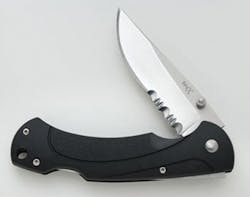Recently, I received two knives from tecX for review. Having never heard of tecX before, I was a bit wary about how good they could be, but I was pleasantly surprised. The knives I received were the Inceptra (Model T0074.5T) and the TK-1 (Model T0094.5S).
First we will take a look at the Inceptra. The tecX website, states the following features:
- 440 Stainless Drop Point Blade with Titanium Coat
- Stainless Handle with Titanium Coat
- Liner Lock
- Pocket Clip
- 4.5″ (11.43cm)
- 5.4oz (153.09g)
As you can see in the picture, the Inceptra has a smooth handle, other than a few ridges on the back of the handle at the rear; where there is also a lanyard hole. The pocket clip is attached at the pivot end of the handle and is not movable, from one side to the other, or from end to end. I know everyone has their preferences in handle/grip and pocket clip configurations, but hear is mine. I prefer to have some sort of texture in order to enhance the grip. I also like to have a pocket clip that is movable, which makes it easy for me to configure it for my carry preference. So, the smooth handle and fixed pocket clip location are the only minor shortcoming that I would say the Inceptra has.
When I first opened the box and pulled this knife out, I noticed that it had some weight behind it. It is about 2 ounces heavier than what I’m use to for a knife this size, but considering that it is all 440 Stainless, it isn’t bad. As stated about, it features a drop point blade that has a sharp edge on it. Like all knives that I test, I sliced paper, cut and slashed away at cardboard, and stabbed into plywood. This knife sliced through the paper without tearing it, made a mess of the cardboard, and stuck into the plywood without a problem. After all this, the blade was still sharp. Who out there hasn’t shaved a bit of arm hair to check how sharp a knife is, well I did without problem after all the previously mentioned tests. The blade is easily opened with push of the thumb stud that is on both side of the blade. It also features a liner lock, which positively engaged each and every time I opened the blade without issue. As with all liner locks, it is made from spring steel; which I found to be strong, but not too much. It is strong enough to keep from accidentally unlocking the blade, but not so much to make it difficult. I would have to say the Inceptra performed well. This knife is also available with a partially serrated blade if you like that.
Now we will take a look at the TK-1, with the following features:
- 440 Stainless Drop Point Blade with Partial Serration
- Glass Reinforced ABS Handle
- Lockback Lock
- Pocket Clip
- 4.5″ (11.43cm)
- 3.6oz (102.06g)
Of these two knives, the TK-1 is my favorite. It is kind of hard to tell from the picture, but parts of the handle are fairly smooth, but also has a texture in just the right areas, and is not an aggressive texture that will tear up your pants pocket. As you can see, the handle does have a lanyard hole, not something that I commonly use on a knife, but nice to have if needed. Like the Inceptra, the TK-1 has a fixed location for the pocket clip and is attached at the pivot end of the handle.
The TK-1 weighs 3.6oz, which is about what most knives of similar design weigh. This particular model comes with a partially serrated blade, but is also available without the serrations. It has been awhile since I’ve carried a knife that had the lockback style locking mechanism, so it took a little time to get used to it again, but it worked without issue. The TK-1 also features a thumb stud on both sides of the blade for easy opening. I did all the above mentioned tests on this knife, along with the arm shaving test afterwards. The TK-1 passed all the tests flawlessly. This knife performed well, and as mentioned before is my favorite of the two. It just may become one of my everyday carry knives.
tecX has a large selection of knives, so check them out at www.tecx.com.
About the author:
Steve Forgues started his career over 18 years ago in Arizona. Over the years, Forgues has worked contract security, police, corrections and tactical operations. Forgues has been an instructor in various disciplines since 1998, and has been working and training with canines since 2000. Forgues has also been writing for law enforcement since 2005. He is currently working as a police officer and firefighter in Pennsylvania.

Steven Forgues
Steve Forgues started his career over 18 years ago in Arizona. Over the years, Forgues has worked contract security, police, corrections and tactical operations. Forgues has been an instructor in various disciplines since 1998, and has been working and training with canines since 2000. Forgues has also been writing for law enforcement since 2005. He is currently working as a police officer and firefighter in Pennsylvania.



